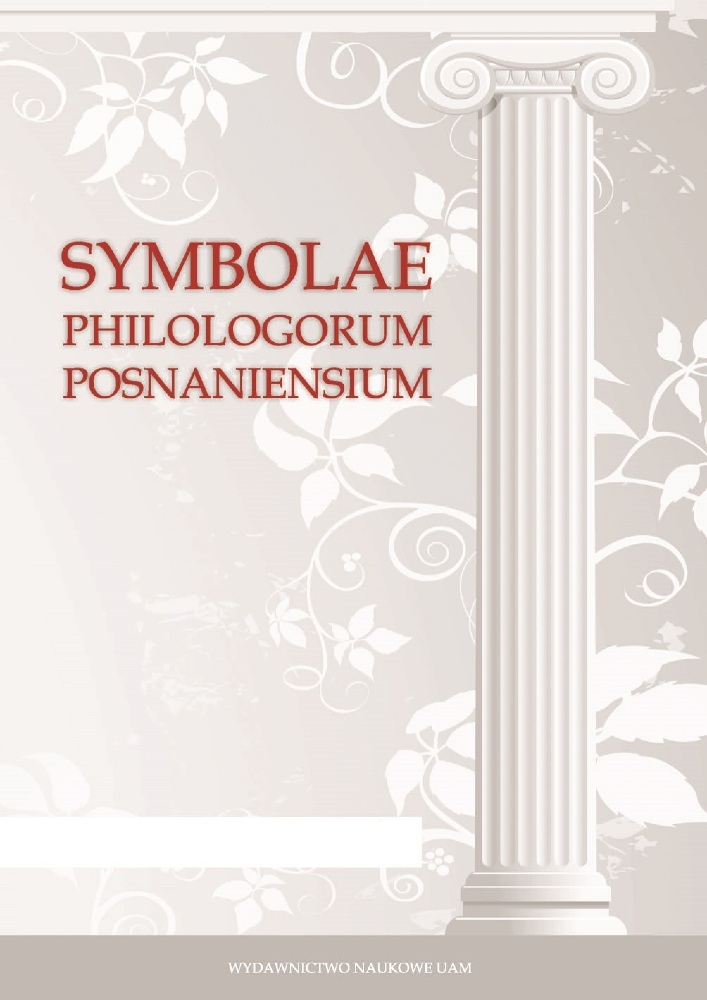Abstrakt
Vogt-Spira Gregor, Latin: Back to the Future? Some Reflections on Latin and Literacy in the Digital Age (Łacina: powrót do przyszłości? Kilka refleksji nad łaciną i kwestiami literackimi w epoce digitalizacji).This paper argues that Latin meets the challenges of this day and age so that its preservation actually has a well-founded place within European countries and societies. The argumentation starts by the observation that Latin gathers a number of additional values as an alterity training, a cognitive training, a linguistic training or a socially integrative effect, values, which are remarkably not bound to a specific culture. Above all, digitization and the modern cybernetic world is seen as a central challenge, digitization with its enormous quantitative increase in reading and writing activity also transforms the user profile in a way that complements it, a factor to which educational institutions have yet to come up with a conclusive response. Referring to this development, Latin has the particular significance of imparting the standards of an elaborate written form into the composition and decoding of texts. Furthermore, Latinity itself is considered to be one of the key factors that have shaped modern-day Europe, and the later Latin-language literature is seen to be a comprehensive component of each country’s respective national literature and culture. To conclude, the ancient European custom is brought into focus that, practically, antiquity serves as a vehicle for legitimizing modernization.
Bibliografia
Bettini 2017: Bettini, M. 2017. A che servono i Greci e i Romani. Torino: Einaudi.
Büchner 1978: Büchner, K. (ed.). 1978. Latein und Europa. Traditionen und Renaissancen. Stuttgart: Reclam.
Brause 2018: Brause, C. 2018. “Neuköllns Eliteschule.” DIE WELT 20. März 2018, p. 8.
Drillon 2016: Drillon, J. 2016. “10 bonnes raisons d’apprendre le latin.” Accessed May 31, 2019. http://pileface.com/sollers/IMG/pdf/10%20bonnes%20raisons.pdf
Fuhrmann 1976: Fuhrmann, M. 1976. Alte Sprachen in der Krise? Stuttgart.
Fuhrmann 2001: Fuhrmann, M. 2001. Latein und Europa. Geschichte des gelehrten Unterrichts in Deutschland von Karl dem Großen bis Wilhelm II. Köln: Dumont.
Gardini 2016: Gardini, N. 2016. Viva il latino. Storie e bellezza di una lingua inutile. Milano.
Goethe 1987: Goethe, Johann Wolfgang. 1987. Sämtliche Werke nach Epochen seines Schaffens (Münchner Ausgabe), Bd. 9: Epoche der Wahlverwandtschaften 1807–1814, ed. Ch. Siegrist, Hans J. Becker u,a., München.
Günther, Ludwig 1994–1996.
Günther. H. and O. Ludwig (eds.). 1994–1996. Schrift und Schriftlichkeit / Writing and Its Use. Ein interdisziplinäres Handbuch internationaler Forschung / An Interdisciplinary Handbook of Inernational Research, 2 vol. Berlin–New York.
Hölscher 1994: Hölscher, U. 1994. Das nächste Fremde. Von Texten der griechischen Frühzeit und ihrem Reflex in der Moderne. München.
Jauch 2006: Jauch, G. 2006. “Latein geht Umwege.” Der Spiegel 2006, Nr. 14, p. 146.
Jaumann 1999: Jaumann, H. 1999. “Das dreistellige Translatio-Schema und einige Schwierigkeiten mit der Renaissance in Deutschland.” In Rezeption und Identität. Die kulturelle Auseinandersetzung Roms mit Griechenland als europäisches Paradigma. Ed. by G. Vogt-Spira and B. Rommel, 335–349. Stuttgart.
Leonhardt 2009. Leonhardt, J. 2009. Latein. Geschichte einer Weltsprache München.
Anonymous. n.d. “Voici quelques bonnes raisons d’apprendre le latin aujourd’hui.” Accessed May 31, 2019. http://webetab.ac-bordeaux.fr/college-marguerite-navarre/fileadmin/0640607M/fichiers_publics/info6_latin.pdf
Lévi-Strauss 1973: Lévi-Strauss, C. 1973. Anthropologie structurale deux. Paris.
Lowe 2012: Lowe, C. “Top 10 Reasons for Studying Latin.” Classical Christian Education for All Ages. Accessed June 22, 2019. file:///Users/administrator/Desktop/Texte/Materialien%20und%20Lit.vz/Latein/Top%2010%20Reasons%20for%20Studying%20Latin%20%7C%20Memoria%20Press.webarchive
Maier 2008: Maier F. Warum Latein? Zehn gute Gründe. Stuttgart.
Moore n.d.: Moore, K. n.d., “Why Latin?” Classical Academic Press. Accessed May 31, 2019. https://classicalacademicpress.com/wp-content/uploads/2016/03/why_latin.pdf.
Robert 2007: Robert, J. 2007. “Audite simiam Ciceronis: Nachahmung und Renaissancepoetik –ein systematischer Aufriß.” In Maske und Mosaik. Poetik, Sprache, Wissen im 16. Jahrhundert. Ed. by J.-D. Müller and J. Robert, 75–127. Münster.
Scaliger 1994–2011: Scaliger, Julius Caesar. 1994–2011. Poetices libri septem. Sieben Bücher über die Dichtkunst. Unter Mitwirkung von M. Fuhrmann hrsg., übers., eingel. und erl. von L. Deitz und G. Vogt-Spira, 6 Bde., Stuttgart–Bad Cannstatt.
Schmidt 1975: Schmidt, P.L. 1975: “Die Anfänge der institutionellen Rhetorik in Rom.” In Monumentum Chiloniense. Festschrift für Erich Burck. Ed. by E. Lefèvre, 183–216. Amsterdam.
Stroh 2007: Stroh W. 2007. Latein ist tot, es lebe Latein: Kleine Geschichte einer großen Sprache. Berlin.
Vogt-Spira 2003: Vogt-Spira, G. 2003. “La formazione del concetto di arcaico. Omero e Virgilio nel Rinascimento tra storia della letteratura e critica letteraria.” Atti e memorie della Accademia Petrarca di lettere, arti e scienze 65: 423–448.
Vogt-Spira 2011: Vogt-Spira, G. 2011. Challenges of Global Competition in Tertiary Education. Trieste: EUT Edizioni Università di Trieste.
Weiler 2009: Weiler, H.N. 2009. “Bildung im Zeitalter ihrer technischen Reproduzierbarkeit.” In Bildung? Bildung! 26 Thesen zur Bildung als Herausforderung im 21. Jahrhundert. Ed. by A. Schlüter and P. Strohschneider, 93–100. Berlin.
Wieacker 1978: Wieacker, F. “Vom Lebenswert des römischen Rechts.” In Latein und Europa. Traditionen und Renaissancen. Ed. by K. Büchner, 84–99. Stuttgart.
Wiegel 2015: Wiegel, M. 2015. “Sokrates und Seneca in der Banlieu.” Frankfurter Allgemeine Zeitung 28. November 2015, p. 3.
Licencja
